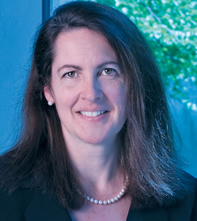
KATHLEEN STEBE
University of Pennsylvania
CURVATURE DIRECTED ASSEMBLY OF COLLOIDS AT INTERFACES
Concepts of organized assembly of small components to make some larger, organized structure pervade science and engineering. For example, strategies for self-assembly exploit weak, order kBT inteactions between molecules or colloids to guide the formation of organized superstructures, and directed assembly is often achieved by applying external fields like electro-magnetic fields to drive structure formation. We take a different approach to directed assembly. We define and exploit energy landscapes in confined soft matter hosts by controlling their shape and boundary conditions. Colloids placed in these hosts create deformations that often cost energy. Since these deformations decay over distances similar to the particles, there is an energy field around the particle. This field is dependent on the energy landscape in the host. Particles migrate and assemble guided by this dependence with remarkable fidelity. This phenomenon is remarkably rich and reveals new physics of interaction. We discuss three examples: capillary interactions between microparticles on curved fluid interfaces, colloids on curved lipid bilayer vesicles and particles in confined nematic liquid crystals (NLCs). Emerging work in which we will exploit these phenomena in structure formation and in microrobotics is described.
Date/Time |
Location 200 College Street Wallberg Building Room 116 |
 KATHLEEN STEBE is the Deputy Dean for Research and Innovation and the Goodwin Professor in the School Engineering and Applied Sciences at the University of Pennsylvania. Educated at the City College of New York, she received a B.A. in Economics, Magna cum Laude, and a Ph.D. in Chemical Engineering at the Levich Institute under the guidance of Charles Maldarelli. Thereafter, she spent a post-doctoral year in Compiegne, France with Dominique Barthes Biesel. Professor Stebe joined the Department of Chemical Engineering at Johns Hopkins University, where she rose through the ranks to become Professor and to serve as the department chair. She then joined the faculty at the University of Pennsylvania as chair of Chemical and Biomolecular Engineering. Professor Stebe has been a Fellow at the Radcliffe Institute for Advanced Studies. She has received the Robert S. Pond Excellence in Teaching Award at JHU, the Frenkiel Award from the Division of Fluid Dynamics of the American Physical Society, and was named a Fellow of the APS and a Fellow of the Johns Hopkins Society of Scholars.
KATHLEEN STEBE is the Deputy Dean for Research and Innovation and the Goodwin Professor in the School Engineering and Applied Sciences at the University of Pennsylvania. Educated at the City College of New York, she received a B.A. in Economics, Magna cum Laude, and a Ph.D. in Chemical Engineering at the Levich Institute under the guidance of Charles Maldarelli. Thereafter, she spent a post-doctoral year in Compiegne, France with Dominique Barthes Biesel. Professor Stebe joined the Department of Chemical Engineering at Johns Hopkins University, where she rose through the ranks to become Professor and to serve as the department chair. She then joined the faculty at the University of Pennsylvania as chair of Chemical and Biomolecular Engineering. Professor Stebe has been a Fellow at the Radcliffe Institute for Advanced Studies. She has received the Robert S. Pond Excellence in Teaching Award at JHU, the Frenkiel Award from the Division of Fluid Dynamics of the American Physical Society, and was named a Fellow of the APS and a Fellow of the Johns Hopkins Society of Scholars.
Professor Stebe’s recent research focuses on assembly in soft matter and at fluid interfaces, with an emphasis on confinement, geometry, and emergent structures. She is an expert interfacial flows, in particular on the manner in which surfactants and complexes at interfaces alter interfacial stresses. Other aspects of her research address dynamic surface tension, rheology of protein laden interfaces, and the design of interfaces and bounding surfaces for novel functional materials.
| For more info: http://uoft.me/LLE17-18 |
Websites of Interest
- University of Toronto
- Faculty of Applied Science & Engineering
- Department of Chemical Engineering & Applied Chemistry
